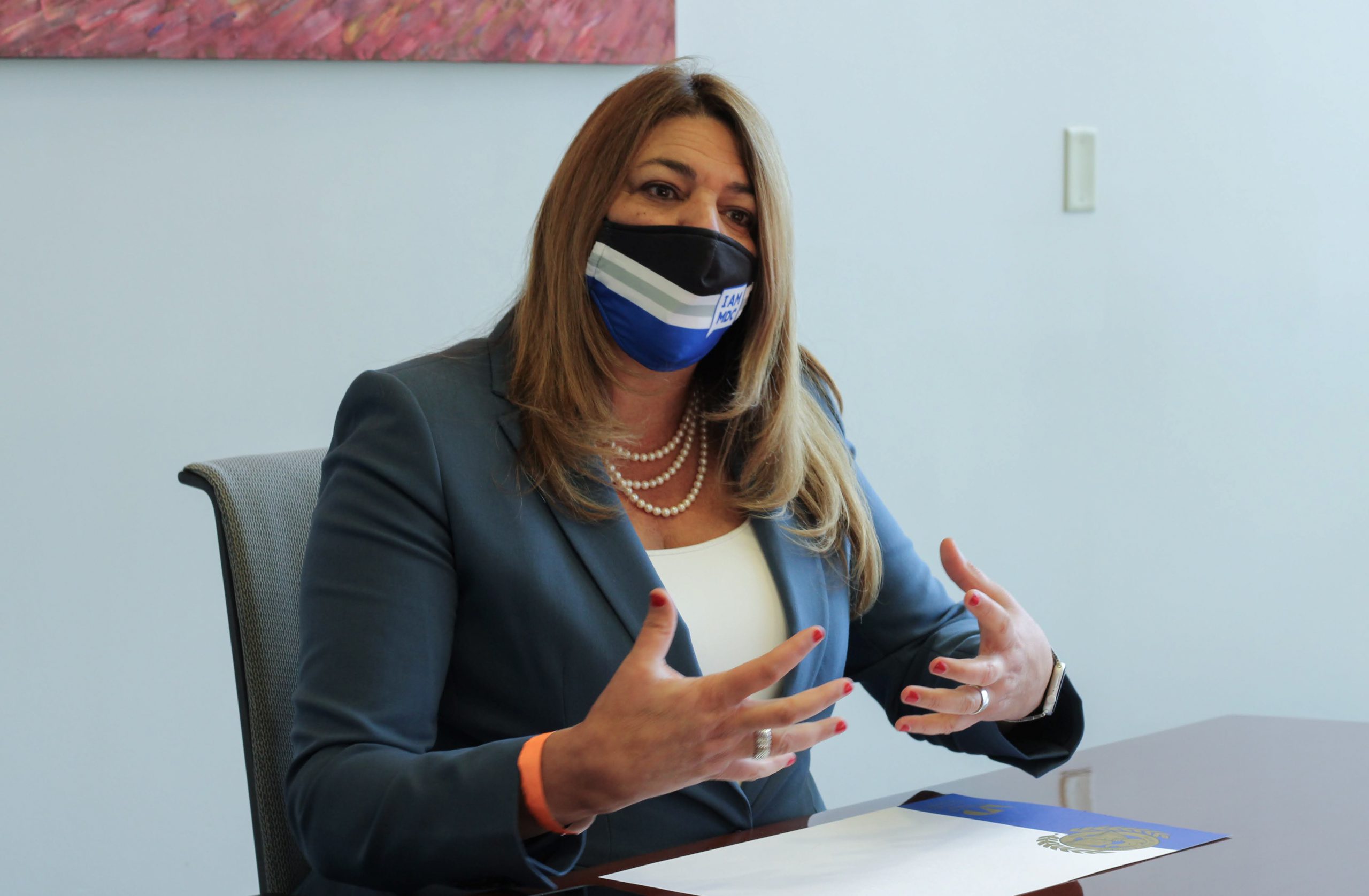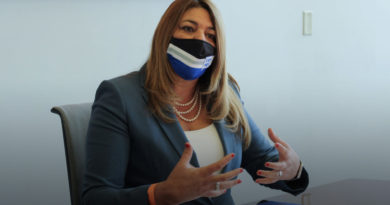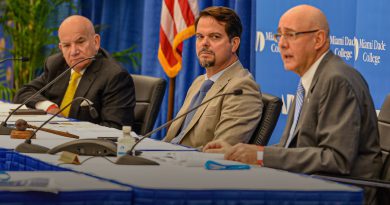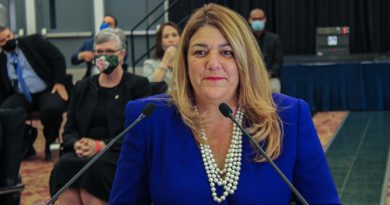MDC President Madeline Pumariega Sits Down For Q&A With The Reporter
Madeline Pumariega, who was selected as Miami Dade College’s first female president in mid-November, officially started her duties on Jan. 4.
Pumariega, who previously worked at the College for more than 25 years and has also served as chief executive of Take Stock In Children, chancellor of the Florida College System and executive vice president and provost at Tallahassee Community College, hit the ground running.
During her three weeks in office, Pumariega has created a new synchronous and virtual teaching modality called MDC Live, started a vaccination campaign for MDC professors who are at least 65 years old, and launched new scholarships for students to increase enrollment. In addition, she tabbed respected long-time MDC administrator Malou C. Harrison as the school’s executive vice president and provost.
Pumariega, who was born in Hialeah and graduated from Kendall Campus in 1987, sat down with The Reporter to discuss the initiatives she has launched and her plans for the College. Here is the interview:
Getting Settled
Q: How have your first three weeks as president of Miami Dade College been?
A: It’s been great. In my first week, I had an opportunity to visit all eight campuses. At the end of the week, I realized we weren’t using Zoom so we went ahead and we implemented Zoom as another technology tool for our students and for our faculty. We also launched MDC Live, which was a way that we could do courses in a synchronous way for our students and faculty to still engage—whether they’re using Blackboard or they’re using Zoom or Microsoft Teams to have this interaction together. So that was a lot of fun. The second week, we focused on COVID and making sure that our campuses could do testing for COVID. So we launched a partnership to be able to do testing at the North Campus and at the Kendall Campus. And that week we also announced vaccines for employees that were 65 and older with a partnership with Jackson [Health System]. And then this third week has been about legislative sessions. We’re deep into committee weeks with the legislature so I’ve been doing a lot of meet-and-greets with our local delegation in Tallahassee, as well as some of our commissioners. So overall, it’s been fun—especially visiting the campuses; I love being out there and talking to our faculty and our staff and our students.
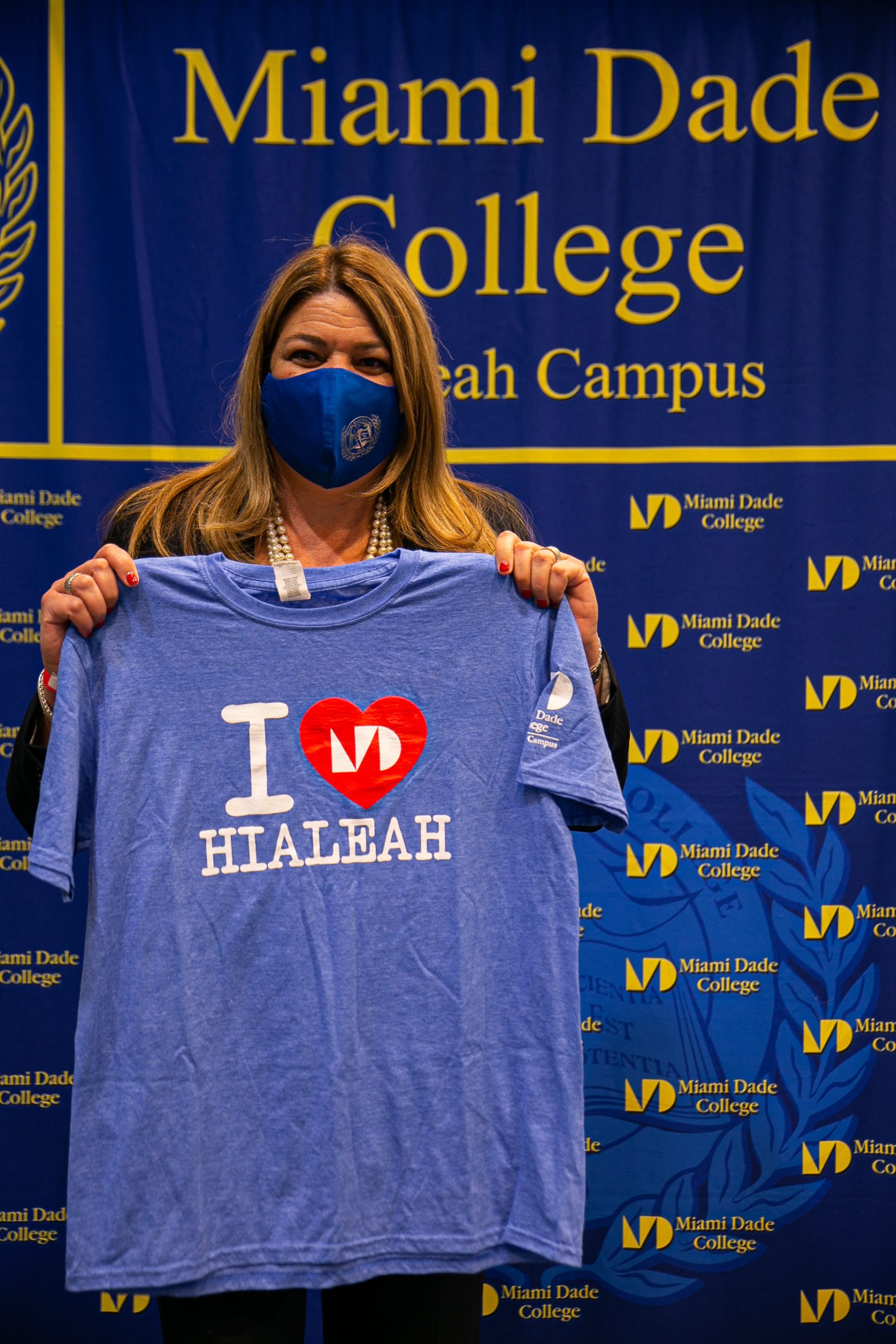
Q: How has your familiarity with the College helped you?
A: You know, I believe it’s really helped because I know the people of the College. There’s a lot of new faces but so many people who were here while I was working and sometimes working alongside them. And I think it’s always important to build trust with the people that you work with and to be able to come in and already know them has been helpful. I think the other part that’s been really helpful is knowing the community. Miami is special for lots of reasons—and South Florida, Hialeah, Homestead—so to know that about our community has also been really helpful. And knowing our students too: growing up, being born and raised here, and knowing my experience as a student at Miami Dade College. It’s about knowing what you need as students and being able to support that.
Q: There are positions at the College—such as chief of staff—that need to be filled. What are you looking for in a candidate?
A: I think someone that can work with the entire College, work with our faculty, our staff, our students, and then most importantly, work with the community. I think that it’s really important that we are the community’s college and that the chief of staff has those relationships and has the opportunity to work externally with all of the programs that we have out in the community.
Enrollment
Q: Low enrollment has been one of the College’s main concerns throughout the pandemic. What are some of the incentives being used to combat this?
A: We’re offering scholarships. We know that sometimes students stop attending or think that they can’t come to college because they can’t afford it. We don’t want the financial barrier to be the reason that a student stops their education or doesn’t come back. So we’re offering scholarship programs, not only for our students that are here but also for those students that are coming back. We are also teaming up with Florida’s Department of Education to make rapid-response credentials. We’ve put a series of programs—digital marketing, EMT, among other programs—that help students get a quick certificate within 18 weeks that can maybe help them get reemployed.
Q: What would it mean for the College if enrollment does not increase?
A: Our budget is about 50 percent tuition and fees from students and 50 percent from state appropriation. So if we saw a long-term decline in student enrollment that would have a budget implication. But I really think we’re going to turn it around. You know my message to students is that this is the time to invest in your education. We’re going to get past COVID, I promise. We’re going to get to the other side and we’re going to see jobs come back. This is almost the perfect time to invest in those credentials and get that A.A. finished so that you are ready for the opportunities that will become available as the economy returns after we get through the pandemic.
MDC Live
Q: Some students showed frustration and confusion over the terminology for class modalities—blended, remote, synchronous, asynchronous, etc. What is MDC Live exactly?
A: They are synchronous, virtual courses. Right now we have MDC face-to-face where you come to class in the traditional way. We have MDC Online, which you do in a self-paced way by meeting the deadlines. There’s hybrid or blended that is a little bit of coming to campus and a little bit of online. And what we were missing is I think the clearest one—MDC Live. It’s about ‘let’s meet up on Monday, Wednesday and Friday at 9:50 on Zoom’ so that we’re keeping physical distance but you’re still interacting.
Q: Do you think this new teaching modality will help increase enrollment?
A: I think it will. Students weren’t sure about wanting to be inside a classroom and I really believe that this takes care of a couple of things. One, the physical safety of our students and our faculty, which are a priority. Second, it addresses students wanting to still engage with faculty but not necessarily having to do it on campus. Now they can do it in a breakout room, they can do it virtually. So I do think that it addresses some of those concerns.
Q: During the last Board of Trustees meeting the College announced it will renew its contract with Blackboard because it’s too soon to consider a change. Are you looking at other online learning platforms?
A: The college has a contract with Blackboard and either you renew or you go through a procurement process [that] takes longer than just a couple of months. It’s hard to do that in the middle of a pandemic so what we said, which we think is the best thing, is let’s extend Blackboard for one more year and then go through the procurement process. At the end of the process—which will engage faculty and will engage students—there will be a recommendation that may be Blackboard or it may not be. But I didn’t think you could rush the implementation of a learning management system, especially not during a pandemic when we’re relying so much on that learning management system.
Coronavirus
Q: Miami Dade College has upped its coronavirus relief efforts since you became president. Can you give us some details on what your plans in this area are?
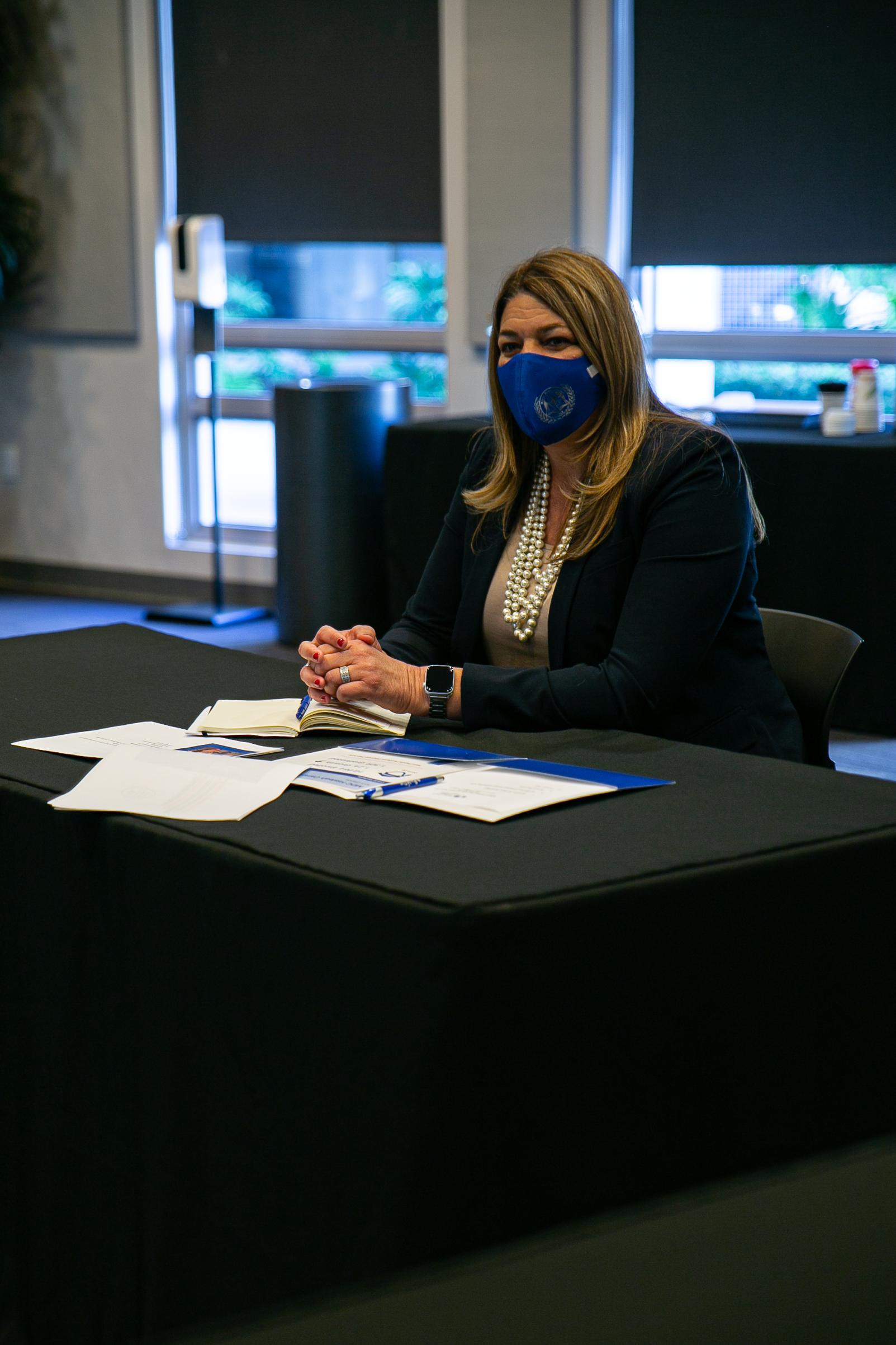
A: We have a three-part approach. First and foremost is following all of the CDC guidelines. [That is] physical distancing at any one of our campuses by keeping that six feet apart, wearing our face coverings like we are wearing right now, and checking the temperature of students, faculty and staff when they come into the campus. The second aspect is testing. We’ve implemented it now at the North and the Kendall campuses so if you need to get tested, you can and it’s free. We know that access to testing helps those preventive measures stop the spread in the community. And then the third part is vaccines [for school employees who are 65 or older]. I think it’s pretty clear now we have a multifaceted approach.
Q: What permanent effects do you think that pandemic will have on education?
A: I hope great effects. I believe that it’s important for the college to reimagine the student experience beyond the pandemic. I think that students are going to have a different set of expectations; for example, the live teaching modality. I think students that are in high school right now are experiencing that on Zoom they get to see their teachers, their friends and to interact. I think that will stay, beyond the pandemic. And I think all of the technology support too. For example, previously you had to come to campus to get tutoring support but today you can get it in a virtual environment. I think that stays.
The Future
Q: What other plans do you have for Miami Dade College and what areas would you like to improve?
A: One of the things I want to do is make sure that we’re supporting students in the best way that we can, that we’re providing those early connections to college, and that we continue to increase and enhance our dual enrollment opportunities. I think that is a great way for students to come to us, dual enrollment and AP credit. We can also create an acceleration program so they can finish their A.A. and transfer, strengthen the transfer and connection points, make sure that students have everything they need if they’re going to finish their A.A. and transfer on to one of the state universities. I also want to make sure that the future of work is right now. We used to think we had a little bit of a longer runway but I think COVID accelerated that. So I want to make sure that we’re working with industry partners, we’re working with Mayor Francis [X. Suarez] and Mayor [Daniella Levine] Cava especially so that the tech companies that want to come to Miami know we have the talent they need to be able to grow and thrive here in our community. So connecting our students to those opportunities for the future of work and developing those new and innovative programs. In addition, making sure that we are providing our faculty and our staff the best professional development so that they too are learning the most advanced topics—you know, whether it’s pedagogy, whether it’s supporting student success, whether it’s enhancing technology. We are also doing that within the organization, so that we make sure that the experience a student has at Miami Dade College is really second to none.
